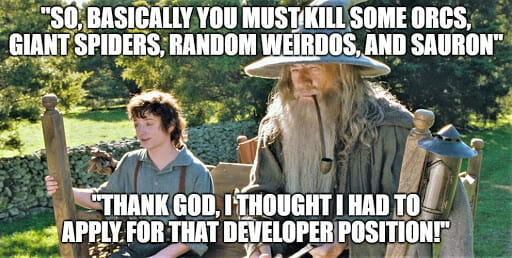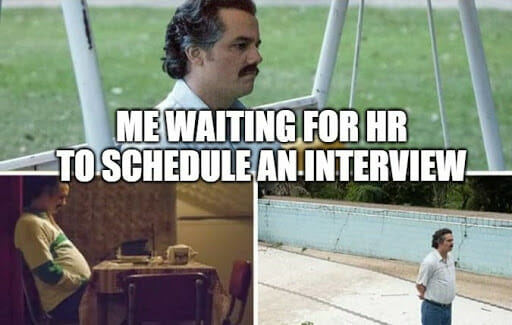5 Terrible Recruiting Mistakes to Avoid in the IT Industry

The recruiting process is a long and winding road, especially in a dynamic and skill-intensive industry like IT.
According to rumors, Frodo fled the Shire and made his way to Mount Doom cause the alternative was to apply for a hobbit software development company.
Are you planning to hire talented new recruits for your IT company? Would you like them to join your team instead of running around Middle-earth with a ring in their pocket?
Here are 5 mistakes you should avoid in order to improve and streamline your hiring procedures.
1. Job offers with missing information
So obvious … but still so common.
Providing incomplete information in your job posting is a mistake that makes you look like an amateur in the first place. If you yourself don’t know what you want, why would people take you seriously?
The second negative consequence is that candidates will not be able to get a precise idea of your team and your development projects.
You may be overwhelmed with applications that do not match your needs and requirements, and therefore waste an infinite amount of time filtering the candidates who are actually suitable.
2. Forgetting or ignoring candidates
Anyone applying for an open position in your IT company is putting themselves on the line and dedicating a portion of their precious time, hoping to offer you their skills (and earn a salary, of course).
The bare minimum you can do for candidates is not to let them get depressed in the long wait for an answer.
An answer that may never come. Sigh.
This can be due to a flaw in your CV collection system. In severe cases, you may even lose the resumes of some candidates. Or you may simply not be ready to handle the heavy flow of applications and end up responding after weeks.
What if you’re just a lazy HR manager?
If instead, we are not dealing with an accident but with a voluntary choice due to negligence and laziness, well, it’s a BAD choice.
Everyone has the right to receive a clear answer and, if possible, within a reasonable time, including people clearly unsuitable for the proposed role.
Leaving them on their toes not only risks making you lose good developers, but also creates resentment and negative feedback that will end up ruining your company’s reputation.
Remember that the demand for developers is very high. According to the CodinGame Developer Survey 2021, the majority of companies (64%) are looking to hire up to 50 developers this year.
It means that many other recruiters out there will be happy to grab the candidates foolishly mistreated by you…
“The majority of companies (64%) are looking to hire up to 50 developers this year.”

3. Setting up interviews in a rush
The fact that wasting your candidates’ time is a blatant disrespect shouldn’t lead you to make the opposite mistake.
Setting up a job interview for the next day usually has two effects. The first is that you will appear as an HR manager with little regard for the personal commitments of your applicants.
You know… people have their own schedules that usually can’t be adjusted overnight just to satisfy your rush to talk.
Another unfortunate result is that candidates will perceive you as a poorly organized manager or, even worse, as desperate. And nobody trusts a desperate company, cause something is clearly going wrong with it.
4. Poorly prepared and managed interviews
Ok, finally it’s time for interviews. After all these preparations, what could possibly go wrong? Well, for example, the recruiter might not have a clue of what is going on.
Poor preparation and a general lack of authority and professionalism can have disastrous effects when they occur in the culminating phase of the recruitment process, namely the HR interview.
A phase in which all the weak points of a company and its recruiters are revealed to applicants.
A few examples? Think of a recruiter unable to effectively clarify candidates’ doubts regarding the open position and the company itself, or without a lineup of questions ready in advance.
Regarding recruiters’ technical and negotiating skills…
Poor technical knowledge can also be a problem. No one expects typical developer and data analyst skills from an HR manager. Still, we’re talking about IT, an industry where technical competencies are bread-and-butter.
But it is not just a matter of organization and technicalities. The mood of the conversation is fundamental too. In this respect, many recruiters struggle to find a balance between being in control of the interview and maintaining a friendly, welcoming environment.
Dictating the terms of the agreement is mainly up to the company. At the same time, we should not forget that IT is one of those “special” fields in which employees benefit from a massive negotiating power.
In the end, capable developers are relatively few in comparison to demand. This implies that the job interview is not only a test for the candidate but also a delicate negotiation game between the IT company and the applicant.

5. Frustrating technical assessment
After a chat about compensation, benefits, and the meaning of life, every candidate for a developer position should be tested and evaluated in terms of technical skills. And here comes the trouble.
Such screening risks making the recruiting experience frustrating for at least two reasons. The first depends on who supports HR managers during interviews and technical tests, that is, professional coders and software engineers.
As we have already said, in fact, recruiters should have some basic knowledge related to the world in which they operate, but the “hardcore stuff” must be handled by the experts.
The technical interviews and the related practical exams remain however a very “human” issue, which must be evaluated with due empathy and tact. Qualities that not all professionals in this sector, even the most technically prepared ones, necessarily have.
I’m not saying that IT specialists can often be introverted and sociopathic nerds … Okay, actually I’m saying so.
Technical tests should be a challenge, not a nightmare
Another situation that can make applicants extremely frustrated is the excessive and unnecessary length or complexity of the tasks given to assess their skills.
This is the best way to discourage the applicants before even hiring them. Instead, find a good balance that allows you to engage your candidates in a healthy and valid challenge.
The above is true even and above all if some kind of practical test is planned before the actual interview. Nobody wants to work on a horribly long assignment for a whole week before they even know if they will be invited for a personal meeting.
Recruiting is a minefield
The recruiting process is an essential component of any business, but it’s also a path full of pitfalls.
All the more so in the IT field, a constantly growing sector where new technologies follow each other at a frenetic pace and the competition to recruit the best professionals is relentless.
In fact, it’s no secret that IT companies are facing a general shortage of available talent.
According to the Stack Overflow Developer Survey 2019, only 6.4% of the 90,000 developers surveyed said they are currently unemployed and looking for a job.
Recruiting or outsourcing?
Such a task is even more complicated and challenging after the COVID-19 pandemic, which forced many human resources departments to switch to remote recruiting and upgrade their skill sets and working methods.
On the other hand, the evolution of IT to full remote business models may end up being an advantage by offering a larger pool of talented professionals who can work from anywhere, including outsourcing companies.
This last possibility could prove to be the solution that best suits your needs. In fact, outsourcing helps you avoid the risks and pitfalls of recruiting by relying on an already consolidated team of highly qualified professionals.
Professionals who, between Mount Doom and a career in IT, have chosen the career in IT.
Brave guys.
Need support with your software development?

Andrea Di Stefano
Andrea is a journalist and teacher of Italian with a long-standing interest in tech and media. He loves to handle touchscreens, but to correct his students’ homework he prefers the good old red marker on paper!
